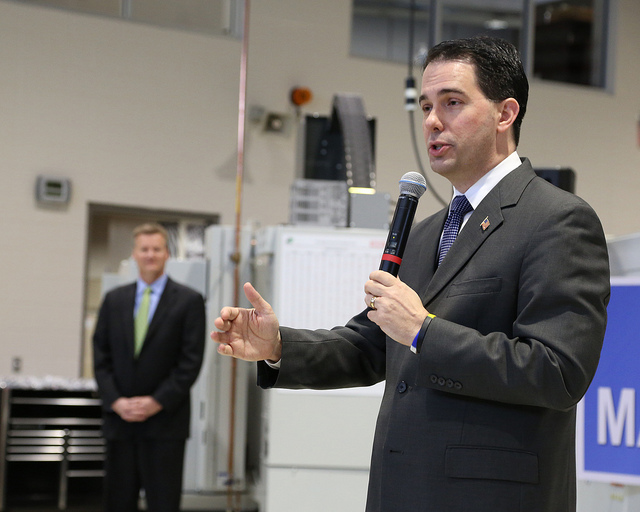
Today Governor Scott Walker signed legislation (SB 44) making Wisconsin the 25th state to adopt a Right-to-Work law, which forbids the forced collection of union dues as a condition of employment.
The Wisconsin Assembly approved the legislation Friday 62-35 after more than nearly 20 hours of contentious debate. Governor Walker signed it this morning at Badger Meter — a flow measurement and control product manufacturer — in Brown Deer, Wisconsin.
Americans for Tax Reform (ATR) and the Center for Worker Freedom (CWF) congratulate Gov. Walker for joining with his state’s legislature and making Wisconsin’s labor market freer and more competitive.
“For decades, Wisconsin workers have been forced to join labor unions and pay dues — often two percent of their paycheck or $1,000 for a person earning $50,000 — with no choice,” said Grover Norquist, president of Americans for Tax Reform. “The ability to say ‘no thank you’ to union control and union dues is a basic civil right that is restored today to the people of Wisconsin.”
CWF executive director Matt Patterson noted, “Right-to-Work means more jobs and, more importantly, more freedom.”
Patterson noted that Right-to-Work can be good for unions as well as workers. “When unions are forced to attract workers with persuasion instead of force, they become more responsive to their members.”
Wisconsin joins Indiana and Michigan as recent Midwest adopters, in large part due to Right-to-Work’s role in driving economic growth.
Key data points regarding Right to Work:
- Between 1977-2012, employment growth in Right-to-Work states outpaced the national average, 105 percent to 71 percent.
- A 2012 Rasmussen poll found that 74 percent of Americans support Right to Work.
- “Incomes rise following the passage of Right to Work laws,” according to an interstate analysis of Right to Work conducted by economist Richard Vedder.
- Indiana can thank its recently passed Right to Work law for 107 new business projects responsible for a projected 10,000 new jobs and over $3 billion in investment, according to the Indiana Economic Development Corporation.

